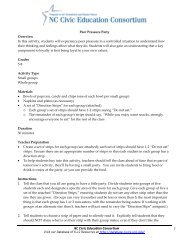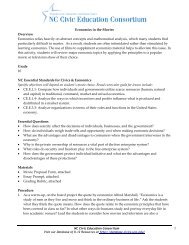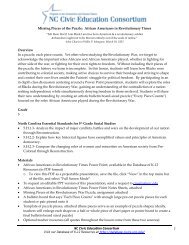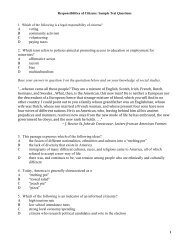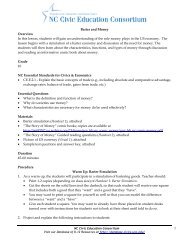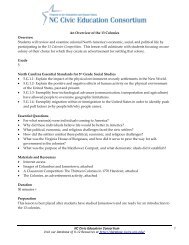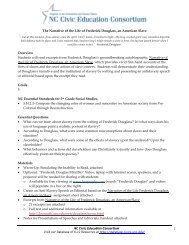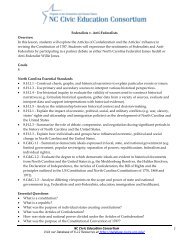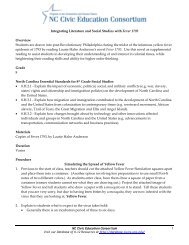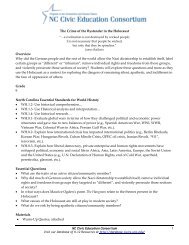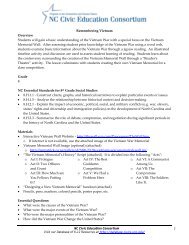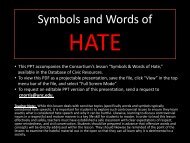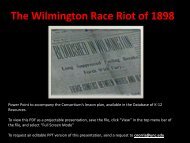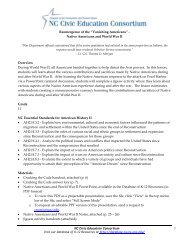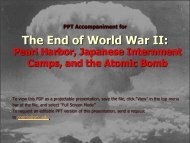Political Parties And Conventions Overview - Database of K-12 ...
Political Parties And Conventions Overview - Database of K-12 ...
Political Parties And Conventions Overview - Database of K-12 ...
- No tags were found...
Create successful ePaper yourself
Turn your PDF publications into a flip-book with our unique Google optimized e-Paper software.
Introduction to How <strong>Political</strong> <strong>Conventions</strong> Work<br />
From “How Stuff Works” - http://people.howstuffworks.com/political-convention.htm/printable<br />
The political convention is a uniquely American tradition, one that is focused on the political parties that have<br />
defined Americans' choices in government for nearly 175 years. <strong>Political</strong> conventions, and the party system they<br />
are an integral part <strong>of</strong>, are not mentioned in the U.S. Constitution. Indeed, the founding fathers <strong>of</strong> American<br />
government viewed political parties with distrust or outright hostility. Yet today, Americans can hardly imagine<br />
a government without political parties, and the parties' conventions are enormous, televised media events.<br />
In this article, we'll learn how political conventions came about, how they have changed, and what they are used<br />
for. We'll also look at some famous events at political conventions in American history.<br />
Functions <strong>of</strong> <strong>Conventions</strong><br />
Originally, the main purpose <strong>of</strong> political conventions was to nominate the party's candidate for president. In<br />
the 1800s, the movement in the United States was to place more political power directly in the hands <strong>of</strong> the<br />
citizens. <strong>Political</strong> conventions were one way <strong>of</strong> doing this: Previously, candidates were nominated in secret<br />
caucuses by members <strong>of</strong> Congress; candidates would now be chosen by delegates who were selected at the state<br />
or county level by the party members.<br />
The democratization <strong>of</strong> presidential elections eventually took the nominating function away from the<br />
conventions. People wanted more direct control over their party's nominees, so the presidential primaries came<br />
into use (although some states still use caucuses). Party members vote in the primaries to choose whom they<br />
want to represent their party in the upcoming election. By the time <strong>of</strong> the convention, there is no suspense about<br />
who will be the nominee -- it has been known for months.<br />
<strong>Political</strong> conventions serve other purposes beyond nominating the party candidate, which is why they're still<br />
around. The convention <strong>of</strong>fers party members a chance to gather together and discuss the party's platform. The<br />
platform is the party's stance on the political issues <strong>of</strong> the day. For a long time, the convention was a place for<br />
political debate, and important decisions were made there. In 1860, the Democratic Party debated the<br />
government's right to outlaw slavery. When the party adopted the position that the Supreme Court could decide<br />
the slavery issue, delegates from several southern states walked out, resulting in the Southern Democratic Party.<br />
In 1980, Senator Edward Kennedy fought against incumbent Jimmy Carter's economic plan. Although Carter<br />
defeated Kennedy for the nomination, Kennedy's debate forced Carter to radically change his plan.<br />
Today, even this function <strong>of</strong> the convention has been largely stripped away. The conventions have been<br />
streamlined, with important events and speeches scheduled for prime-time television hours. The parties work to<br />
eliminate any evidence <strong>of</strong> debate or disunity within the party. The political conventions have now been reduced<br />
to the status <strong>of</strong> infomercials, marketing the ideas and personalities <strong>of</strong> the party to the public. While the<br />
conventions serve to unify the party and generate party pride, the "advertisement for the party" has become the<br />
primary function <strong>of</strong> political conventions today.<br />
Now we'll look at who gets to go to the conventions, and what they do there.<br />
Media at the <strong>Conventions</strong><br />
The original closed-door caucuses in the early 1800s were mentioned only briefly in newspapers, and only<br />
through indirect accounts. As the process became more open, media coverage became more widespread. The<br />
<strong>of</strong>ten chaotic atmosphere <strong>of</strong> the conventions was difficult to get across in a printed article, however.<br />
NC Civic Education Consortium <strong>12</strong><br />
Visit our <strong>Database</strong> <strong>of</strong> K-<strong>12</strong> Resources at http://database.civics.unc.edu/



